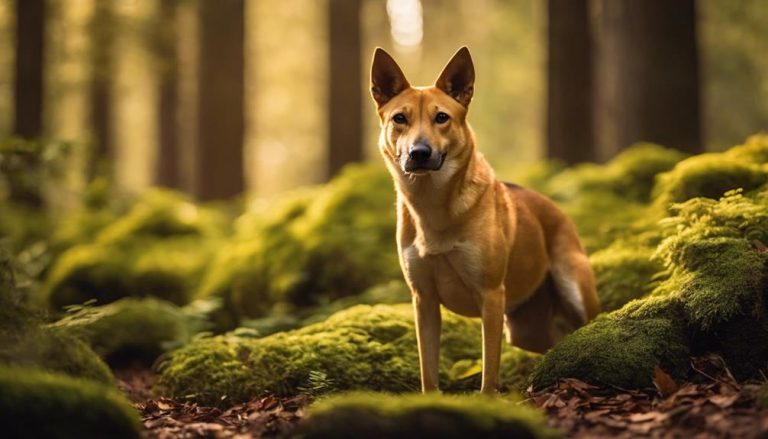Carolina Dog: Origin and Traits
The Carolina Dog was officially recognized by the American Kennel Club in 2017. This breed, native to the United States, shows physical traits similar to ancient wild dogs. It’s known for its adaptability, intelligence, and resilience, qualities that have helped it survive over time. The Carolina Dog stands about 17.75 to 19.5 inches tall and weighs between 30 to 55 pounds, which matches its energetic lifestyle.
Research has connected this breed back to ancient dogs from East Asia. This indicates a blend of both domestic and wild behaviors in their DNA. In fact, 37% of Carolina Dogs have a distinct East Asian genetic marker. Understanding their background and care needs offers a glimpse into their unique evolution from wild to domestic life.
The Carolina Dog is medium-sized and perfectly suited for active owners due to its size and energy levels. It’s important to know about their history and how to care for them, as this helps in appreciating their journey from ancient times to becoming a beloved pet today.
Key Takeaways
- Originating in the USA, Carolina Dogs have a 12-15 year lifespan.
- They joined the AKC’s Hound group in 2017.
- These dogs resemble ancient wild canines and need regular exercise.
Quick Facts
The Carolina Dog hails from the United States and is known for being a medium-sized breed that easily adapts to different environments. They have a life expectancy of 12-15 years and typically have a short, smooth coat that often comes in a sable pattern. Their ability to adjust to various living situations, including apartments, is remarkable, as long as they get enough exercise and mental engagement.
This breed’s coat can come in various colors, showcasing its genetic variety. The Carolina Dog’s adaptability isn’t just about where it can live; it also shines through in its wide range of sensitivity levels. Some can be incredibly resilient and laid-back, while others might take their time processing their surroundings. This means owners need to tailor their approach to training and socializing to fit their specific dog.
Choosing a Carolina Dog could be an excellent decision for those ready to understand and meet its needs. Their primitive roots give them a unique personality, but it’s crucial for potential owners to consider how well they can handle and appreciate these traits. The right match between a dog and its owner is key to fostering a strong and happy relationship.
Overview
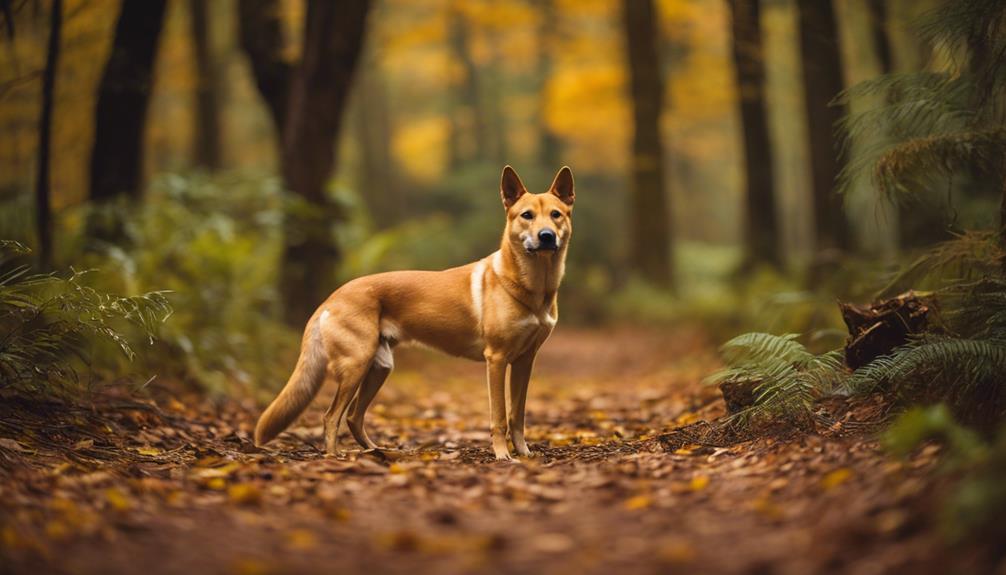
Exploring the Carolina Dog breed, we find a medium-sized dog with an impressive background. These dogs stand between 17.75 to 19.5 inches tall and weigh between 30 to 55 pounds, boasting a life expectancy of 12 to 15 years. They’re categorized under the Foundation Stock Service group due to their primitive roots and close ties to Native American history. What makes Carolina Dogs stand out is their physical traits that closely resemble wild canines like jackals or wolves, notably their upright, long, and slender ears which significantly improve their hearing.
In 2017, the American Kennel Club acknowledged the breed’s unique qualities and historical importance, adding them to the Hound group. This inclusion highlights their skill in tasks requiring sharp senses, like scent tracking. Initially, these dogs might appear reserved or cautious, but they’re capable of forming strong connections with people. Once they feel part of a human ‘pack,’ they adjust well to being a pet. Their blend of adaptability and ancient lineage makes them not just intriguing for study but also beloved pets for those who value the history and instinctual behaviors of this Native American dog breed.
American Dingo Discovery
The Carolina Dog‘s story took a fascinating turn in the 1970s, thanks to Dr. I. Lehr Brisbin. He found that these dogs, often called American Dingos, might trace their roots back to ancient dogs that came to North America. This discovery challenged what many thought about where these dogs came from.
Characterized by their distinctive looks and survival skills, Carolina Dogs have traits like alert ears and expressive tails. They’re known for being smart and tough, traits that have helped them thrive in the wild. These dogs are not just survivors; they’re also deeply loyal pets that bond closely with their families. However, they do need regular exercise to stay healthy and happy. On average, they live between 12 to 15 years, showing their overall hardiness and health.
| Characteristic | Description | Impact on Discovery |
|---|---|---|
| Appearance | Similar to dingos or jackals | Caused initial confusion |
| Naming | Named ‘Carolina Dogs’ by Brisbin | Gave the breed formal recognition |
| Survival Traits | Smart and need daily exercise | Showed their adaptability |
| Lifespan | Healthy with a 12-15 years lifespan | Proof of their resilience |
The work of Lehr Brisbin in identifying the Carolina Dog as the American Dingo is a crucial piece in understanding how dogs evolved in North America.
Ancient Roots Revealed

The Carolina Dog reveals an intriguing story of dog evolution in North America. Thanks to modern genetic analysis, we now understand their deep historical connections and origins, highlighting the breed’s ancient background. These findings not only give us insight into their genetic identity but also shed light on their behavior and how they’ve managed to survive through the ages.
- Origin and Ancestry: Their history traces back to ancient migrations, showing a direct link to early dog ancestors.
- Genetic Discovery: Cutting-edge DNA tests show they’re closely related to ancient dog groups.
- Behavioral Insights: Research into their actions shows a mix of tame and wild tendencies, showing their unique development over time.
- Survival Mechanisms: They have evolved unique ways to thrive in various tough environments over thousands of years.
The Carolina Dog’s story is a testament to the enduring bond between humans and dogs. Through genetic research, we’ve uncovered their path from ancient companions to the pets we know today. This journey not only tells us about their past but also helps us understand the adaptability and resilience of dogs. It’s a fascinating chapter in the history of domesticated animals, offering insights into how our four-legged friends have stood by our side through every challenge.
Origin and Ancestry
Carolina dogs have a fascinating history that traces back to ancient times, long before the rise of human civilizations in the Americas. They are believed to have originated from prehistoric dogs that made their way from East Asia, showcasing a deep connection between these regions through their genetic makeup. This link is crucial as it shows how Carolina dogs are not just any breed; they hold a special place in the story of canine evolution and migration.
Recent genetic research has shed light on the unique ancestry of Carolina dogs. It has been discovered that they share significant genetic traits with East Asian dog breeds. This discovery is important because it provides insights into the movement and migration patterns of ancient dogs and their human companions across continents. Carolina dogs stand out among North American breeds because of these distinct genetic markers.
Understanding the genetics of Carolina dogs helps us appreciate their role in the history of domesticated dogs. It’s not just about where they come from but also about recognizing the journey that led them here. Their story is a testament to the enduring bond between humans and dogs, highlighting the Carolina dog’s significance as a unique breed with a rich heritage.
Genetic Discovery
Recent genetic studies have shed light on the Carolina dog’s ancient roots, tracing back to before Columbus arrived in the Americas. These studies reveal a complex genetic makeup in this breed. About 58% of Carolina dogs share genetic markers common worldwide, showing they come from a diverse genetic pool. Interestingly, 5% of these dogs have genetic ties to breeds in Korea and Japan, suggesting an intriguing connection to East Asian dogs.
A notable 37% of Carolina dogs carry a special genetic signature from East Asia, highlighting the breed’s varied ancestry. Research into their mitochondrial DNA confirms these dogs have been in North America for a very long time, cementing their place as a unique breed with a deep history. This work not only adds to our understanding of the Carolina dog’s background but also celebrates the breed’s distinct heritage.
Behavioral Insights
Exploring the behavior of Carolina dogs, we see how their ancient origins shape their way of life. These dogs have a strong sense of pack mentality, and they fiercely defend their territory. This behavior is a nod to their survival instincts and the social structures of their wild ancestors. Female Carolina dogs have a unique reproductive pattern, with three estrus cycles in a row, maximizing their chance of success in the wild. After this period, they move to seasonal cycles, showing their ability to adapt to their surroundings. Research on their genetics traces their journey from East Asia and confirms their presence before Columbus arrived, highlighting the deep history of the Carolina dog breed.
Their territorial nature and adaptation abilities are key to understanding these dogs. Scientific findings about their migration and reproductive habits offer insights into their unique behaviors, linking back to their ancient roots. The Carolina dog’s behaviors, from how they interact with their pack to how they reproduce, are deeply embedded in their DNA, telling the story of a breed with a rich heritage and remarkable survival strategies.
Medium Build
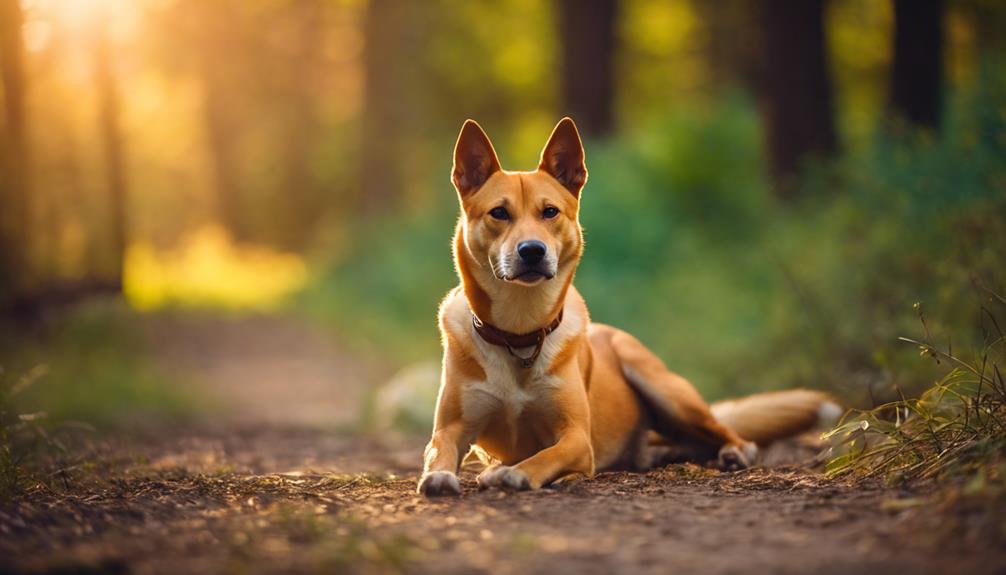
Understanding the health and well-being of a Carolina dog with a medium build is essential. This breed, known for its lean yet durable frame, requires specific care to stay in top shape. We will cover:
- The ideal weight range they should maintain.
- Their exercise needs to stay fit and happy.
- Common health issues to watch out for.
- The diet they need to thrive.
Carolina dogs have a unique physique that sets them apart. Keeping them within the right weight range is vital for their health. Regular exercise is not just beneficial; it’s necessary for their physical and mental well-being. Like all breeds, they have certain health conditions they’re prone to, so being informed is key. Lastly, their nutrition plays a crucial role in their overall health, demanding a balanced and appropriate diet.
Keeping these factors in mind ensures your Carolina dog lives a happy, healthy life.
Ideal Weight Range
For Carolina dogs with a medium build, keeping their weight between 30 and 55 pounds is key. This range is not only ideal for their health but also suits their naturally active and agile nature. Carolina dogs, known for their sighthound background, thrive when their weight is managed well.
Staying within this weight bracket is crucial for their overall health. A balanced diet is central to achieving this, as it needs to match the energy requirements of this active dog breed. Regular weight checks are also important to catch any early signs of health problems. Being in the right weight range helps maintain a good balance of muscle mass and keeps fat to a minimum, which is perfect for a lively and happy dog. This approach to weight management highlights the importance of understanding and catering to the specific needs of different dog breeds.
Exercise Requirements
Carolina dogs, with their medium size, need daily exercise to stay healthy and happy. They are naturally agile and active, so they require plenty of physical activities to avoid weight gain and behavioral problems. Regular play and outdoor exercise are crucial for their well-being. It’s important to give them lots of chances to run, walk, and play to meet their exercise needs. This routine is essential not just for their physical health but also for preventing health issues, improving their life quality.
Having a routine that includes playing fetch or going on hikes can help keep these dogs in great shape. Engaging in such activities with them ensures they get the exercise they need and strengthens your bond. Remember, keeping Carolina dogs active and engaged is key to their overall happiness.
Common Health Concerns
Carolina dogs are known for their sturdy health and medium size, but like any breed, they have their own set of health concerns. These dogs often live a long life, usually around 12 to 15 years, but keeping them healthy requires some effort.
It’s critical to keep them active to prevent obesity and related health issues, which can affect their quality of life. Their coat is low-maintenance, yet regular checks can help catch any skin problems early.
Feeding them a diet rich in nutrients is key to avoiding dietary deficiencies and promoting their overall health. Regular vet visits are essential for catching any health issues early on and keeping your Carolina dog in top shape.
Nutritional Needs
Medium-sized Carolina Dogs need a diet that’s carefully designed to keep up with their energy levels and support strong muscles. Their meals should be rich in high-quality proteins, healthy fats, and vital vitamins and minerals. Because they have a strong instinct to hunt, it’s crucial their food helps them stay active and keeps their muscles lean. Good protein sources like lean meats and fish provide the necessary amino acids for muscle repair and energy.
Healthy fats are essential for a shiny coat and skin, and they’re a rich source of energy too. Vitamins and minerals play a big role in growth, boosting the immune system, and overall health. It’s always a good idea to talk to a vet to make sure your Carolina Dog’s diet meets their specific needs. This will help keep them in great shape and full of energy.
Grooming Essentials
Carolina Dogs are medium-sized dogs known for their vibrant health and energy. They have a relatively low-maintenance grooming routine due to their short to medium-length coats. These coats come in beautiful shades of tan to ginger, requiring only occasional brushing. This helps keep their skin healthy by removing dead fur.
It’s best to bathe these dogs only when necessary to avoid stripping their skin of its natural oils. Regular check-ups for skin conditions or parasite infestations like ticks are important, especially since Carolina Dogs love the outdoors. Eye checks are also recommended to catch any signs of irritation or infection early on.
Taking care of their ears is another aspect of grooming that shouldn’t be overlooked. Consulting a vet for professional advice on ear care is a smart move. This ensures their hearing stays sharp and contributes to their overall health.
Independent Temperament
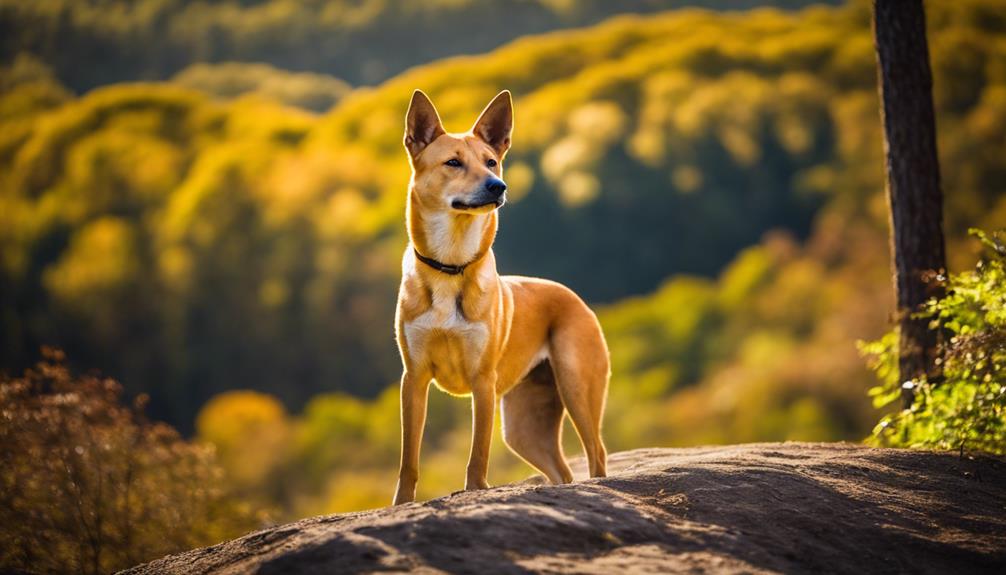
The Carolina Dog, known for its independent nature, showcases a fascinating aspect of evolution. This trait helped them survive for centuries without human help, making them quite self-reliant. However, this independence can make it a bit tricky to fit them into family life.
Their self-sufficiency comes from a history of survival in the wild. Despite their wild roots, Carolina Dogs can adapt to living with humans if they are socialized early on. Socializing them from a young age is crucial to help them get comfortable around people, which makes them easier to live with.
Although they value their independence, Carolina Dogs can become great companions in a home setting. They do best with training that is both patient and consistent. This approach helps them learn how to be part of a family, showing that even the most independent dog can enjoy domestic life.
Traits of Independence
Carolina dogs are known for their strong independent streak, a trait shaped by their wild ancestors. This independence shows in how they behave and interact with others. They’re great at making their own decisions, which can make them a bit wary around new people. However, this same trait means they’re incredibly loyal and protective of their families.
Because Carolina dogs are so self-sufficient, training and socializing them needs a focused effort. The goal is to guide their independence in a positive direction, helping them learn how to behave around others and prevent any possible issues that might come from their love of autonomy.
In essence, understanding and respecting their need for independence while providing firm, consistent guidance is key. This approach helps strengthen the bond between these dogs and their owners, ensuring a harmonious relationship.
Training Independent Dogs
Training Carolina Dogs, known for their independent streak, requires patience, consistency, and positive reinforcement. These dogs don’t always respond well to traditional training methods because of their need for autonomy. Using rewards to encourage good behavior is key, making them more eager to learn.
Setting clear boundaries and keeping their minds active are crucial for their attention and to avoid bad habits. Starting socialization early helps them become well-adjusted, capable of handling different situations calmly. Giving them choices during training acknowledges their independence and makes the learning process more engaging, creating a positive trainer-dog relationship.
Challenges With Independence
Carolina Dogs have a history that traces back to wild and stray ancestors, making them naturally independent. This independent streak can be a challenge in homes, as it may lead to shyness or hesitation around new people. To overcome this, early and consistent socialization is key. Using positive methods to build trust is crucial.
Socialization needs to be structured and positive to help these dogs feel safe and connected. Without early training, it’s harder to form a close bond, highlighting why understanding their need for independence matters. Balancing their independence with family life is vital for a strong, loyal relationship.
Encouraging Healthy Independence
Understanding the natural independence of Carolina Dogs lays the groundwork for encouraging their inherent self-reliance while also ensuring they bond well with their human companions. These dogs come from a background of primitive survival, making them highly adaptable and capable of taking care of themselves. This trait of being self-reliant doesn’t stop them from forming deep connections with humans. In fact, their ability to balance independence with a friendly and sociable attitude makes them great pets for families, even those with children.
To make the most of a Carolina Dog’s independence, it’s crucial to focus on socialization and consistent training. This approach helps them understand how to behave in a family setting without losing their self-sufficient nature. Proper training and social interactions teach them to navigate their environment confidently while maintaining a loving relationship with their human family.
Independence and Socialization
To help Carolina Dogs adjust well to life with humans and other animals, it’s crucial to start socializing them when they’re young. These dogs naturally love their freedom because they come from a background where they had to fend for themselves. Despite their independent streak, they’re also incredibly flexible in new situations. Socialization is key to preventing them from being too shy or cautious around new faces.
Starting this training early helps them get used to different beings, reducing their fear of strangers. While Carolina Dogs might not always look for constant companionship, they do form strong bonds with their owners. With the right training and socialization, these dogs can become much more outgoing, turning into faithful and loving pets.
Genetic Health Concerns

Understanding genetic health concerns is crucial for the well-being of Carolina Dogs. These concerns include various inheritable conditions that need active management, such as regular check-ups and health screenings. It’s important for breeders and dog owners to know about these risks and how to manage them.
Common Genetic Disorders: It’s vital to recognize and keep track of genetic disorders common in the breed.
Hereditary Disease Screening: Early detection of hereditary diseases is possible through comprehensive screening protocols.
Managing Genetic Risks: By choosing breeding pairs wisely, breeders can reduce the chances of passing on genetic diseases.
Informed Decision-Making for Potential Owners: Prospective dog owners should have access to genetic health information to make knowledgeable choices about their future pets.
For the Carolina Dog breed, being aware of and managing genetic health issues is key to ensuring the dogs have long, healthy lives. This involves regular vet visits and tailored health screenings. Owners and breeders need to work together, armed with the right information, to combat these inheritable conditions effectively.
Common Genetic Disorders
Carolina Dogs have a unique genetic background that makes them more sensitive to certain medications like ivermectin. They also have a higher chance of getting specific genetic disorders. Because of their special heritage, it’s crucial to keep an eye on their health closely. Responsible breeding is key to reducing these health issues.
Regular vet visits are critical for catching and managing any health concerns early.
Carolina Dog owners should always talk openly with their vets. This ensures they fully understand the breed’s health risks. With the right care plans, owners can lower the chances of these genetic problems. This approach helps keep Carolina Dogs healthy and happy.
Hereditary Disease Screening
Screening for hereditary diseases in Carolina dogs is key to catching health issues that could be passed down from their ancestors. This testing helps spot problems like hip dysplasia, patellar luxation, and progressive retinal atrophy. These conditions are common in the breed. With genetic health tests, breeders can make smarter choices, reducing the chance of these diseases in future puppies.
This approach is not just about avoiding bad genes. It’s about ensuring the health and longevity of the Carolina dog breed. Knowing which dogs are carriers of certain diseases helps breeders plan better. This means healthier dogs and a brighter future for the breed.
Managing Genetic Risks
Knowing the genetic predispositions of Carolina dogs helps manage health risks linked to their unique heritage. A notable health concern is their adverse reaction to ivermectin, a drug often used to treat parasites. This reaction highlights the breed’s distinct genetics, which can be traced back to before Columbus arrived in America. To prevent these health issues, Carolina dog owners should have regular vet check-ups. Early detection and treatment of genetic conditions are crucial. Regular health monitoring ensures that Carolina dogs remain healthy, preventing minor issues from becoming severe.
Owners must understand that some health problems in Carolina dogs are due to their genetics. For example, their sensitivity to certain medications reflects their ancient genetic background. Keeping up with veterinary visits is key. These visits help catch and manage any health issues early, ensuring the dogs live long, healthy lives.
Grooming and Maintenance
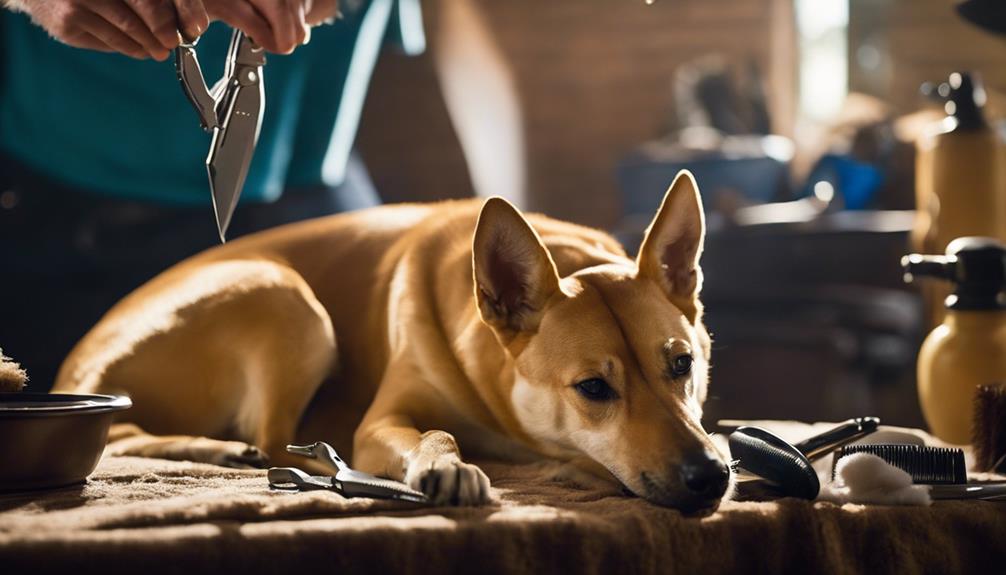
When caring for a Carolina Dog, it’s vital to focus on their grooming and well-being. This involves a variety of care routines, from looking after their coat to keeping their ears clean. Let’s break down some key practices in grooming for these dogs.
Coat Care Essentials involve regular brushing to keep their fur smooth and reduce shedding. For Carolina Dogs, brushing a few times a week should suffice. This not only keeps their coat healthy but also strengthens the bond between you and your pet.
Nail Trimming is another crucial aspect of grooming. Keeping their nails at a comfortable length prevents discomfort and potential injuries. It’s generally recommended to trim your dog’s nails every 3-4 weeks, but always be cautious to avoid cutting too close to the quick.
For Bathing, these dogs don’t need frequent baths, thanks to their short coats. Washing them every few months or when they get particularly dirty is enough. Use a mild dog shampoo to keep their skin and coat in good condition.
Ear Cleaning is important for preventing infections. Gently wiping the outer part of their ears with a damp cloth or a vet-approved ear cleaner can keep their ears clean. Be careful not to insert anything into the ear canal.
Coat Care Essentials
Caring for a Carolina Dog’s coat is straightforward and doesn’t require much fuss. All you really need to do is brush it occasionally to get rid of dead hair and help spread the dog’s natural skin oils. This breed doesn’t need frequent baths; in fact, washing them too often can strip their skin of essential oils, leading to dryness. What’s crucial, though, is keeping an eye out for ticks and other skin issues during regular health checks. Spotting these problems early can prevent more serious conditions, including diseases carried by ticks.
Skin health is a big part of grooming for the Carolina Dog. Pay attention for any signs of irritation, like redness or unusual discharge, especially near sensitive areas such as the eyes. This proactive attitude towards grooming helps keep your dog’s coat and skin in top condition, ensuring they stay happy and healthy.
Nail Trimming Techniques
Trimming your dog’s nails regularly is crucial to keep them comfortable and avoid overgrowth, especially in Carolina dogs. Choose a sharp and precise nail trimmer to prevent the nails from splintering or crushing, which can cause pain or lead to infections.
When trimming, it’s important to be cautious not to cut the quick—the blood vessel inside the nail. This requires examining the nail closely to differentiate the clear nail from the pinkish quick. If you’re not confident about doing it yourself, it’s a good idea to ask for help from a professional groomer or a vet.
Making nail trimming a part of your dog’s regular grooming routine is key to maintaining their health and comfort. Remember, using the right tools and techniques makes all the difference in keeping your Carolina dog happy and healthy.
Bathing Routine Tips
Creating a bathing routine for Carolina Dogs, known for their easy-to-maintain fur but specific needs to keep their natural coat oils intact, is vital for their health. These dogs, hailing from the United States, are versatile and can thrive in many settings. It’s crucial, however, to bathe them in a way that doesn’t strip away their skin’s protective oils.
Using a gentle dog shampoo can prevent skin irritation and keep their coat healthy. This also makes it easier to check for and remove ticks, which is essential for the dog’s overall health. After the bath, drying them properly is important to prevent skin issues and keep them comfortable. This approach ensures the dog remains healthy with minimal interference in their natural grooming processes.
Ear Cleaning Guide
Maintaining the ear health of Carolina Dogs is crucial. To prevent infections, it’s recommended to regularly clean their ears with a solution approved by veterinarians. This not only keeps their ears free from harmful organisms but also contributes to their overall health.
Cotton balls soaked in the cleaning solution should be used to gently wipe the outer ear area. It’s important not to push anything into the ear canal to avoid damage or pushing debris further in. Watch out for signs of ear infections like redness, swelling, foul odor, or unusual discharge during the cleaning routine.
Setting up a consistent ear cleaning schedule is key for the well-being of Carolina Dogs. This practice ensures they stay comfortable and healthy, averting any ear-related issues before they escalate.
Brushing Frequency Recommendations
When talking about the Carolina Dogs, it’s key to note their grooming needs are quite straightforward.
Their short coat doesn’t require much effort to keep it looking good and healthy. Brushing their coat once or twice a week is usually enough. This regular grooming helps keep their coat in top shape and also makes it easier to spot any skin problems early on.
Giving them a bath now and then, depending on how active they are and their environment, is also a good idea. This approach to grooming is not just about keeping them looking great, it’s also a proactive step in avoiding health issues and ensuring they’re always feeling their best.
Dietary Requirements

Understanding the dietary needs of Carolina Dogs is key to their health and long life. Knowing what they should eat, recognizing foods that could cause allergies, and setting up a regular feeding schedule are all vital. These steps help keep them healthy and full of energy.
Carolina Dogs thrive on a diet rich in proteins and fats, with very few grains, mimicking the diet of their ancestors. This diet supports their natural physiological needs. Foods like beef, dairy, and wheat might cause allergic reactions in some dogs, so it’s best to avoid these ingredients to prevent any adverse reactions.
Establishing a regular feeding routine helps with their metabolism and reduces the risk of stomach issues. It’s also beneficial to include certain supplements or nutrients in their diet to prevent common health problems in the breed.
Optimal Nutrition Needs
To make sure Carolina Dogs get the nutrition they need, it’s vital to focus on a diet that includes the right mix of proteins, fats, and carbohydrates. This diet should be customized to fit their active lifestyle and specific health needs.
Considering factors like age, size, and how much they exercise is key in creating the perfect meal plan. This ensures they get exactly what they need to stay healthy. It’s also important to always have fresh water available to keep them properly hydrated.
Feeding them leftovers or too many treats can lead to weight issues and other health problems. Working with a vet to come up with a feeding strategy that meets their unique dietary needs is a smart move. This approach helps keep Carolina Dogs in top shape and supports their overall health.
Common Food Allergies
Like many dog breeds, Carolina dogs can suffer from food allergies. These allergies often manifest as itching, skin rashes, digestive issues, and ear infections. This means that pet owners need to closely monitor their diet to weed out the harmful ingredients. Common triggers include proteins and carbs like chicken, beef, dairy, wheat, and soy.
One effective way to identify the allergen is through an elimination diet. This involves removing ingredients one by one to see which one is causing the problem. Switching to a diet with fewer ingredients or one that’s hypoallergenic can also help ease symptoms.
Working with a vet is key. They can help diagnose the problem accurately and recommend a diet plan that suits your dog’s specific needs. This approach not only reduces allergic reactions but also supports your dog’s overall health.
Feeding Schedule Tips
Creating a feeding schedule that suits the needs of Carolina Dogs is crucial for their health. This includes considering their age, size, and how active they are. High-quality dog food that meets the breed’s needs and the dog’s life stage is key.
Puppies, for instance, need to eat 3-4 times a day due to their fast growth. On the other hand, adult Carolina Dogs do best with two meals a day, one in the morning and one in the evening, to keep their energy levels stable.
Avoid giving them human food or scraps from the table to prevent digestive issues and obesity. It’s a good idea to talk to a vet to get a feeding plan that’s just right for your Carolina Dog, making sure they stay healthy.
Frequently Asked Questions
Is a Carolina Dog a Good Pet?
- Adaptable dogs suit home life well.
- Needs socialization and exercise.
- Intelligence makes training easier.
Do Carolina Dogs Shed a Lot?
- Carolina Dogs shed more during seasons change.
- Grooming helps control shedding.
- A healthy diet supports coat health.
How Do You Tell if Your Dog Is a Carolina Dog?
- Look for a medium-sized dog with straight ears.
- Notice a wolf-like shape and cautious around newcomers.
- Detect pack behavior and a sense of territory.
How Much Does a Carolina Dog Cost?
- Carolina Dogs typically cost $500 to $1,000.
- Price varies with breeder, location, and dog’s lineage.
- Factor in initial vetting and care costs.

